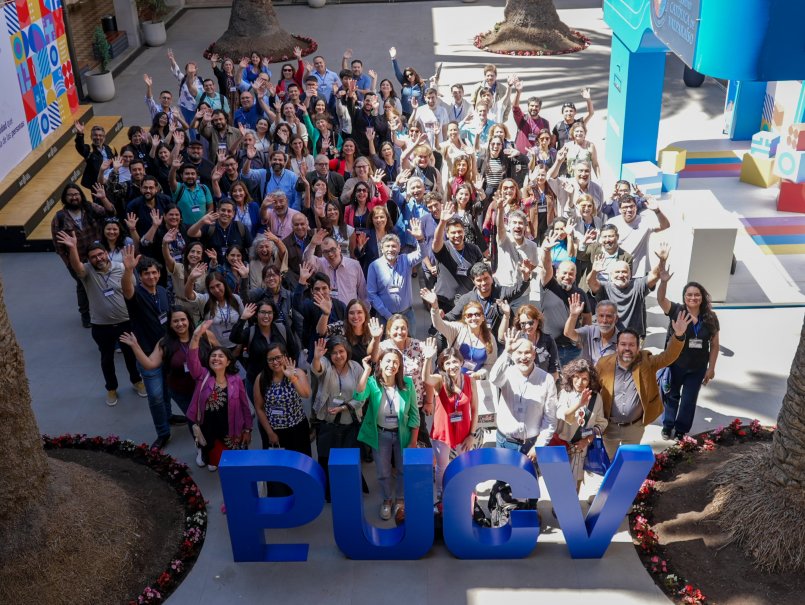
A new step in its consolidation as a I+D+i model in people-centered health was taken by our university within the context of the FIU Frontier project, an initiative that articulates the capabilities of the university in the biomedicine, biotechnology, health and wellbeing fields.
With a lecture given by Francesc Gòdia, president of the European Biotechnology Federation, who highlighted the importance of Biotechnology in health as an economic and social transformation element, the PUCV gathered representatives from the public and private worlds, businesses and the academy, around the development of research and innovation in health.
“Our FIU Frontier project is committed to creating a research center in the biomedical area. We possess all the necessary capabilities; our scholars develop various research lines, and the university has decided to support the creation of this center and improve our abilities in the technological transference area, with a specialty in biomedicine. We intend to be not only regional but national leaders in the development of research of clinical issues that will directly benefit the population”, explained Luis Mercado, Vicerector of Research, Creation and Innovation.
Focus on people
The PUCV FIU Frontier project is a people-centered health initiative that consolidates the capabilities of the university through the creation of a health and wellbeing structure with the implementation of a Biotechnology, Biomedicine and Wellbeing center (CID3B), specialized in advanced diagnosis.

This center will allow to provide solutions, capabilities and support to Strategic actors of the regional health area for the prevention, timely diagnosis and treatment of non-transmissible chronic diseases such as cancer, hypertension, auto-immune diseases, that aggravate in the context of population aging, and – as an identity seal of the PUCV – orphan diseases.
“This type of lifesaving initiative is talent at the service of people. The center, as long as it consolidates its development, will reach its goals, both on medical and technological experimentation. This is an emblematic project for the university in its centenary and a relevant contribution for Valparaíso, the region and the country”, rector Nelson Vásquez stated.
For Claudia Altamirano, executive director of the FIU Frontier project, “this event marks what will be our proposal for the next 10 years in terms of reinforcing and consolidating our capacity for research, development and innovation in the health and wellbeing fields of our university. The main goals we have set for ourselves, the results we foresee for the next 10 years and one of the pillars of this proposal is a research center that articulates the requirements of the region on health and wellbeing topics with the capabilities that the University offers and that are reinforced and controlled through the FIU project”.
Rodrigo González, regional ministry secretary of Science, Technology and Innovation of the Central Macrozone, indicated that “through this instrument of the Ministry of Science that is FIU, we want to connect the research done in the academy with the regional work and needs. We want the university to raise a diagnostic of abilities and tools to tribute to the regional challenges through the Regional Development Strategy, which is the tool that Regional Governments have to define where to focus their resources and priorities.”
Likewise, Maricel Martínez, president of the Science, Technology and Innovation committee of the Valparaíso Regional Council, stated that “it is important to have this connection because the world of academia and science can also be nurtured by the experience we have as regional advisors, which is the knowledge of the territory”.
Biocat: Cataluña Experience
The region of Cataluña, Spain, has a policy named Biocat, that has been fostering biotechnology and biomedicine for 20 years as an economic and social development hub.

According to the explanation by Claudia Altamirano, “through Biocat, various government, universities and health systems capabilities have joined to work together. Francesc Gòdia is here to tell us about that experience, but also about the European experience because since April of this year he serves as the President of the Biotechnology European Federation”.
In his intervention, Francesc Gòdia referred to the technological, medical, biotechnological and Artificial Intelligence aspects that guided the spanish experience to display patient- centered medicine, more personalized and precise.
“The program that took place in Cataluña, which is similar to the Region of Valparaíso in size, has elements that are worthy of noting. From molecules as monoclonal antibodies, advanced cellular therapy, genic therapy, to facilitating technologies so these therapeutic elements can reach the patient and the community, where we can highlight synthetic biology as well as biopharmaceutical production and applied Artificial Intelligence to have disease biomarkers that will allow us to stratify patient populations”, Gòdia explained.
By Erika Schubert
Strategic Communications Department



